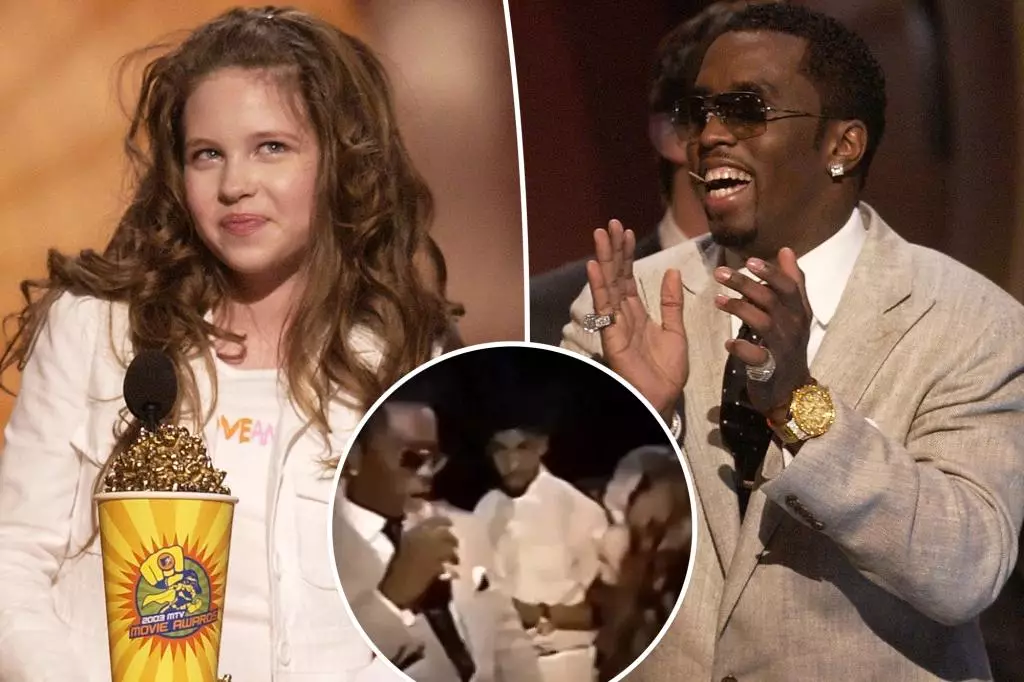In recent days, Sean “Diddy” Combs has found himself in the eye of a storm fueled by resurfacing allegations of sexual misconduct and a particularly revealing viral video. The clip, from the 2003 MTV Movie Awards, features a 33-year-old Diddy inviting then-12-year-old actress Daveigh Chase to an afterparty, an interaction that has taken on a sinister context in light of current allegations. The timing of this rediscovered footage raises questions about the culture of celebrity and power dynamics in Hollywood, especially regarding young individuals who operate within such spaces.
The video itself is innocuous at first glance, showcasing a jovial Diddy engaging playfully with a child actress moments after she won an award for her role in a horror film. However, with Diddy presently facing serious allegations of sex trafficking and sexual assault—affecting hundreds of alleged victims, including minors—the atmosphere surrounding this clip has dramatically shifted. Critics on social media have dissected this benign moment, framing it as a troubling display of adult predation cloaked in a context of excitement and celebration. Comments such as “Diddy did all this publicly, imagine what happened behind closed doors” echo a growing public concern over the potential threats posed by powerful figures—a concern that amplifies with every new revelation about Diddy’s past conduct.
The interaction between Diddy and Chase exemplifies a broader issue at play in entertainment culture, where the blurred lines between mentorship and predation often go unacknowledged. This viral moment inadvertently shines a light on how the industry frequently overlooks the vulnerabilities of young actors and actresses at star-studded gatherings, where adults often hold sway. Social media users have pointed out the “glee” exhibited by Diddy in this interaction, envisioning a world where the innocence of youth might be exploited under the guise of social indulgence. Such scrutiny evokes a necessary discussion: how can young performers be protected in an industry that often prioritizes fame and fortune over safety and integrity?
Diddy’s current legal troubles are nothing short of severe. He faces charges related to sex trafficking, racketeering, fraud, coercion, and transporting individuals for prostitution—all following his arrest last month. Allegations claiming that he abused numerous minors, some as young as nine, paint a disquieting portrait of a man whose celebrity status may have shielded him from scrutiny for too long. Such situations challenge our perceptions of accountability within the entertainment industry and spark intense debate regarding how victims are treated when they finally come forward.
Diddy’s legal representation has demanded the release of the identities of the alleged victims to mount a potential defense, which raises additional ethical questions. If individuals, particularly minors, constitute part of such allegations, should their identities be publicized for the sake of a legal defense? This dilemma illustrates the tragic tug-of-war between justice for alleged survivors and the rights of the accused in high-profile cases.
Chase, now 34, has largely remained silent on the resurface of her image in relation to Diddy’s controversies. After her roles in films like “Donnie Darko,” her social media presence dwindled, and her past legal troubles, including arrests linked to stolen vehicles and drug possession, inevitably shape how society perceives her potential comments on the matter. Although she hasn’t spoken publicly about Diddy, her silence echoes a broader narrative where many young women in Hollywood face repercussions long after their childhood fame fades. This raises another important inquiry: How do we support those who found themselves in the spotlight at an age that deprived them of agency in a world riddled with older male power players?
As the legal proceedings against Diddy unfold, it becomes increasingly apparent that this situation underscores the urgent need for comprehensive reform within the entertainment industry. Policies must be instituted that prioritize the safety of young actors and actresses, ensuring that such spaces no longer harbor potential predators. Conversations about consent, power dynamics, and the protection of minors must take center stage, promoting a cultural shift that champions respect and responsibility in every facet of Hollywood.
The resurfacing of this video and the gravity of the allegations against Diddy not only spotlight systemic issues in the entertainment industry but also challenge society to reconsider how it perceives and protects its most vulnerable members. The intersection of fame, power, and the protection of young talents demands immediate attention and systemic change to prevent future exploitation and to advocate for justice for those harmed.
